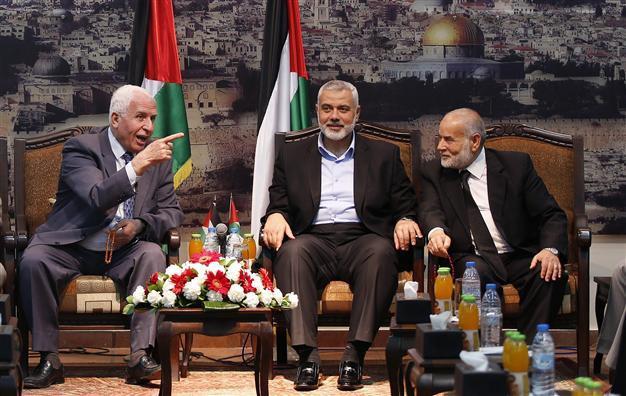Rival Palestinian factions agree to form national unity gov't: Official
GAZA CITY - Agence France-Presse

Al-Ahmed, a senior Fatah official and head of the Hamas government Haniyeh and deputy speaker of Palestinian Parliament Bahar attend a meeting in Gaza City, April 22. AFP Photo
Rival Palestinian leaders from the West Bank and Gaza Strip have decided to form a government of national unity within the "next five weeks," officials said early on April 23.
The agreement, between members of the Palestinian Liberation Organisation and Hamas, was reached following talks in Gaza City which began on the evening of April 22, a member of the PLO who wished to remain anonymous told AFP.
"There has also been progress on the holding of future elections and the composition of the PLO," said the Palestinian official without giving further details. Talks, which are taking place behind closed doors, are expected to continue throughout April 23.
It is not the first time that a national unity government has been announced by the rival factions, and on several previous occasions attempts to form an administration have collapsed.
Fatah, the PLO's main component, and Hamas signed a reconciliation accord in Cairo in 2011 aimed at ending the political divide between Gaza and the Palestinian Authority-ruled West Bank.
But deadlines have come and gone without any progress in implementing provisions of the accord.
Azzam al-Ahmad, a senior figure in president Mahmud Abbas' Fatah party, led the team which were greeted by Hamas prime minister Ismail Haniya and the movement's deputy leader Mussa Abu Marzuq.
Haniya on April 22 had earlier called for cementing Palestinian reconciliation "in order to form one government, one political system and one national programme."
Ahmad said: "I am happy that the time has come to end divisions." The latest announcement of a deal comes as U.S.-brokered peace talks with Israel teeter on the edge of collapse.
The Palestinians met just a week before the end of a nine-month target originally set for an Israeli-Palestinian deal. Hamas is totally opposed to the Palestinian negotiations with Israel.
At the same time, the Palestinians refloated and then played down a threat to dismantle the Palestinian Authority (PA), which is Israel's negotiating partner, if their peace talks remain deadlocked.
"No Palestinian is speaking of an initiative to dismantle the Palestinian Authority," chief negotiator Saeb Erakat said on April 22.
"But Israel's actions have annulled all the legal, political, security, economic and operational aspects of the prerogatives of the Palestinian Authority."
The PA was set up under the 1993 Oslo accords and has won widespread international recognition but is fully dependent on foreign aid for its administration of autonomous areas of the West Bank.
Palestinian negotiators have warned they may hand responsibility for governing the occupied territories back to Israel, a senior Palestinian official said on April 20.
He said the Palestinians had told U.S. peace envoy Martin Indyk that unless Israel releases Palestinian prisoners as agreed and freezes settlement building, they could dismantle the Authority.
U.S. State Department spokeswoman Jennifer Psaki criticised the threat as "extreme" and warned that any such move would affect American aid to the Palestinians.
Israel slams unity talksOn the Israeli side, Prime Minister Benjamin Netanyahu accused the PA of endangering the peace process.
"The Palestinian Authority, which yesterday was talking about its dismantlement, is today talking about unity with Hamas," which fiercely opposes any peace talks with Israel, Netanyahu said.
"They need to decide ... Do they want to dismantle themselves or to unite with Hamas? When they want peace [with Israel], they should let us know."
The rival Palestinian sides also Tuesday in Jerusalem met Indyk in a fresh bid to salvage the negotiations.
As the meeting got underway, Abbas told Israeli journalists he was willing to extend the negotiations beyond April 29 if Israel frees a batch of prisoners previously earmarked for release, freezes settlement building and agrees to discuss the borders of a future Palestinian state.
Israel and the PA have taken a string of hostile steps since the Jewish state refused last month to release the fourth and last group of Palestinian prisoners in line with an earlier agreement.
But a senior Israeli government official rejected Abbas's terms. "He who makes such conditions does not want peace," the official told AFP on condition of anonymity.
